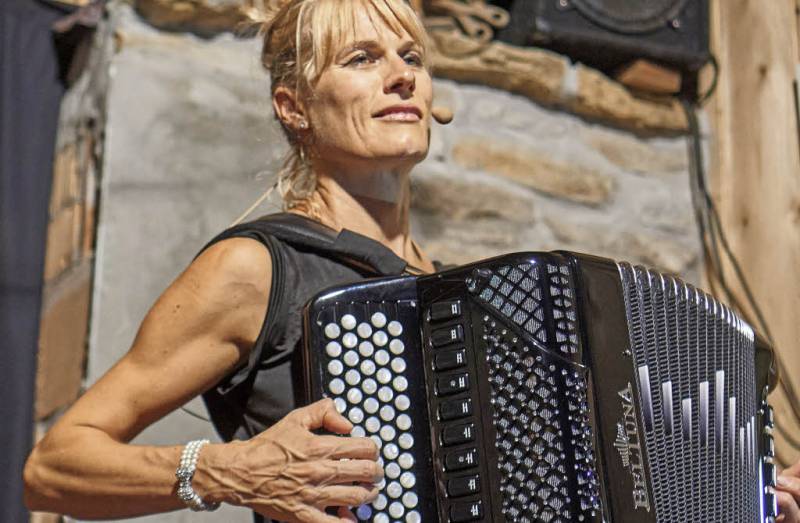Christine Schmid: l’importanza del rispetto verso il pubblico
 Fisarmonicista e cantante teutonica, Christine Schmid è un’artista decisamente completa, assai comunicativa e costantemente alla ricerca della simbiosi e dell’interazione con l’ascoltatore. Imbraccia la fisarmonica, per la prima volta in assoluto, alla tenera età di 3 anni. Studia musica presso il conservatorio di Basilea, a Trossingen e alla “Jazz School” di Parigi. Nel suo curriculum, fra le tante e svariate esperienze, annovera diverse apparizioni televisive. Attraverso questo quattro chiacchiere, descrive gli aspetti più significativi della sua attività musicale.
Fisarmonicista e cantante teutonica, Christine Schmid è un’artista decisamente completa, assai comunicativa e costantemente alla ricerca della simbiosi e dell’interazione con l’ascoltatore. Imbraccia la fisarmonica, per la prima volta in assoluto, alla tenera età di 3 anni. Studia musica presso il conservatorio di Basilea, a Trossingen e alla “Jazz School” di Parigi. Nel suo curriculum, fra le tante e svariate esperienze, annovera diverse apparizioni televisive. Attraverso questo quattro chiacchiere, descrive gli aspetti più significativi della sua attività musicale.
Sei fisarmonicista e cantante. La passione per la fisarmonica e per il canto sono nate entrambe nello stesso periodo?
«No. Ho iniziato con la fisarmonica quando avevo tre anni. Mentre con il canto, solo a sedici anni».
Sei una musicista che ama spaziare tra svariati genere musicali, dalla classica al jazz, dal pop al tango. Con quale stilema senti di esprimere meglio la tua comunicatività?
«È difficile da dire, in quanto il mio cuore palpita per ogni genere musicale. Per quanto concerne il canto, il genere classico è quello più impegnativo, poichè ti dà un’incredibile sensazione quando si sale sino al DO, una nota che una persona comune non è in grado di raggiungere. Adoro tutti i generi, ma tengo molto conto delle aspettative del pubblico».
 Come cantante, ti esibisci anche in veste di soprano, specialmente nelle operette. Dal punto di vista strettamente stilistico, quali sono le analogie e le differenze tecniche e interpretative fra la musica classica e quella moderna?
Come cantante, ti esibisci anche in veste di soprano, specialmente nelle operette. Dal punto di vista strettamente stilistico, quali sono le analogie e le differenze tecniche e interpretative fra la musica classica e quella moderna?
«La musica classica necessita di altre risorse vocali. In questo genere l’estensione è di tre ottave, mentre in altri è di una sola ottava. Il canto classico è un vero piacere per la voce, ma occorre molta preparazione e resistenza alla fatica. Non si può cantare in questo stile quando si è stanchi. Gli altri generi musicali sono più semplici in termini di preparazione tecnica».
Hai tenuto svariati concerti sia in club che in teatro. In che modo cambia l’ascolto da parte del pubblico fra il locale e l’ambiente teatrale?
«Il teatro è adatto alla musica classica anche per esigenze acustiche. Nei club, invece, bisogna utilizzare i microfoni, perché c’è più rumore. Dunque, ciò non è consono alla classica, ma può essere adeguato per altri generi musicali».
 A proposito di teatro, hai interpretato il ruolo di Marlene Dietrich al “Musical Theater” di Basilea. Come hai vissuto questa esperienza professionale?
A proposito di teatro, hai interpretato il ruolo di Marlene Dietrich al “Musical Theater” di Basilea. Come hai vissuto questa esperienza professionale?
«Mi sono immedesimata molto nella parte e ho ammirato tanto Marlene (Dietrich, ndr) in qualità di donna, attrice e cantante. Imparare da coloro per i quali provi ammirazione è un’esperienza che ti arricchisce parecchio, consentendoti di entrare nella loro anima e di emularne la personalità».
Suoni fisarmoniche Beltuna, nota azienda italiana del settore. Quali sono gli aspetti prettamente tecnici che più ti colpiscono di questi strumenti?
«Amo i diversi suoni, perfetti per i differenti generi che pratico. Sono fisarmoniche bellissime e comode, soprattutto nei live. E il suono è molto potente».
Dopo aver maturato molta esperienza come cantante, hai iniziato a dirigere workshop incentrati sulla respirazione. Quali sono, nello specifico, i temi trattati nei tuoi incontri didattici?
«Lavoro con adulti per acquisire sicurezza in me stessa mentre parlo e interagisco con il pubblico. Più la tua voce è strumento, più forte è la tua presenza sul palco. La voce può far manifestare la tua personalità e una forza che non avresti mai pensato di avere. Mi esercito anche ad acquisire la fiducia in se stessi. Meglio conosci le tue risorse, maggiore sarà l’impatto sulla gente. Provo a relazionarmi anche con persone alle quali cerco di trasmettere empatia, invitandole a rispettare il prossimo».
————————————————————————————
Christine Schmid: the respect for the audience
 Accordionist and Teutonic singer, Christine Schmid is a very complete artist, really communicative and constantly looking for symbiosis and interaction with the listener. Take the accordion, for the first time ever, at the tender age of 3 years. He studied music at the Conservatory of Basel, in Trossingen and at the “Jazz School” in Paris. In her curriculum, among many and varied experiences, she includes several television appearances. Through this interview, she describes the most significant aspects of her musical activity.
Accordionist and Teutonic singer, Christine Schmid is a very complete artist, really communicative and constantly looking for symbiosis and interaction with the listener. Take the accordion, for the first time ever, at the tender age of 3 years. He studied music at the Conservatory of Basel, in Trossingen and at the “Jazz School” in Paris. In her curriculum, among many and varied experiences, she includes several television appearances. Through this interview, she describes the most significant aspects of her musical activity.
You are accordionist and singer. Did the passion for the accordion and the singing both come in the same period?
«No. I started playing the accordion when I was three years old, while singing, only at sixteen».
You are a musician who likes to range among various musical genres, from classical to jazz music, from pop to tango. What is the style, with which do you feel to express your communication better?
«It’s hard to say, because my heart throbs for every kind of music. Regarding singing, the classical genre is the most challenging, as it gives you an incredible feeling when you climb up to DO, a note that an ordinary person is unable to reach. I love all genres, but I take the public’s expectations very seriously».
 As a singer, you also perform as a soprano, especially in operettas. From a strictly stylistic point of view, what are the analogies and the technical and interpretative differences between classical and modern music?
As a singer, you also perform as a soprano, especially in operettas. From a strictly stylistic point of view, what are the analogies and the technical and interpretative differences between classical and modern music?
«Classical music requires other vocal resources. In this genre the extension is three octaves, while in others it is only one octave. Classical singing is a real pleasure for the voice, but it is required much preparation and resistance to fatigue. You cannot sing in this style when you are tired. The other musical genres are simpler in terms of technical preparation».
You have held several concerts both in the club and in the theatre. How does audience listening change between the venue and the theatre environment?
«The theatre is suitable for classical music also for acoustic needs. In the clubs, however,I need to use the microphones, because there is much noise. Therefore, this is not in keeping with the classical, but it may be appropriate for other musical genres».
 Tell me, please, your experience in the theatre, you played Marlene Dietrich at the “Musical Theatre” in Basel.
Tell me, please, your experience in the theatre, you played Marlene Dietrich at the “Musical Theatre” in Basel.
«I got so much in the role and I admired Marlene (Dietrich, ed) as a woman, actress and singer. Learning from those for whom you have admiration is an experience that enriches you a lot, allowing you to enter their soul and emulate its personality».
You play a Beltuna accordion, well-known Italian Accordion company. What are the technical aspects that you like at the most about these instruments?
«I love the different sounds, perfect for the different genres that I practice. They are beautiful and comfortable accordions, especially in live shows. And the sound is very powerful».
After having gained a lot of experience as a singer, you started directing workshops focused on breathing. Which are, specifically, the topics covered in your educational meetings?
«I work with adults to gain confidence in myself as I speak and interact with the public. More my voice is like an instrument, stronger is my presence on stage. The voice can make my personality manifest and a force I never thought I had. I also practice to gain self-confidence. As better, I know, my resources, as greater is the impact on people. I try to relate with people to whom I try to convey empathy, inviting them to respect others».

